12 Radical Latinx Groups Building Powerful Cultural Community Spaces
In honor of Latinx Heritage Month, Teen Vogue has created a series of pop culture-related stories to highlight the complex narratives within the community that's contributed to the fabric of American culture.
Latinx people — like other people of color — have not been spared from the systemic violence and oppression of white supremacy in the United States. Add intersectional dimensions like gender, class, disability, or sexuality to the equation, and that violence has the potential to become tremendously exacerbated.
Despite being repeatedly “Othered” by a presidency and society that operates on the hegemony of white heteronormative patriarchal power, the Latinx community is resilient against these oppressive constructs and forces. For women specifically, intersectional feminism has been a valuable tool for resisting. Banding together in times of difficulty has been their biggest strength.
As such, unity for Latinx women has meant creating safe spaces where they can partake in their interests, art, advocacy, and activism without fear of being questioned, judged, attacked, or silenced. These safe spaces provide fostering environments for individuals who are often marginalized or oppressed because of their positionalities — having a safe space with people who look like you or share your values can make a huge difference in your life’s trajectory.
All across the U.S., numerous radical Latinx groups are empowering women, from rock camps teaching them to play instruments, to wellness organizations centering on the health of indigenous bodies. Below, we pulled together a list of radical organizations that vary in their goals and areas of interest, but which are united by their ultimate mission: to improve, nurture, and support the lives of Latinx women and women of color, trans women, non-binary people, and LGBTQ+ communites around the country.
1. Turn it Up!
In the late 1970s, Alice Bag made a name for herself as a Latinx frontwoman spearheading the budding punk scene in Los Angeles with her band, The Bags. Fast-forward to 2019, and not only is she still touring and making powerful new music, but she’s also using her platform to fiercely advocate for Latinxs and other marginalized identities in the punk scene. Alice has started a national collective called Turn it Up, which aims to champion women in the male-dominated music industry. Turn it Up advocates for gender parity and is increasing visibility for women in music through workshops, showcases, fundraisers, and other events.
2. Odiosas
Based in the Bronx borough of New York City, this artistic collective is led by self-described “queer Latinegrxs” Zulema Tiburcio and Mia Smalls. Odiosas is an avenue for creatives to make art, zines, and gatherings based on their Afro-Latinx experiences: “I know as an Afro-Dominicana, I felt like I lived my life in a strange limbo — never quite belonging, never seeing myself, never feeling good enough or pretty enough or loved for my raw self,” Zulema says. The group also focuses on making feminism more accessible for non-academics with their “hood feminism” teachings, and takes a break from heavier issues by collaborating with the Bronx-based HydroPunks collective to host a recurrent party called “The Woes of Being a Weirdo of Colour.” The next event takes place Oct. 18 in New York and the theme is “Emo Nite.”
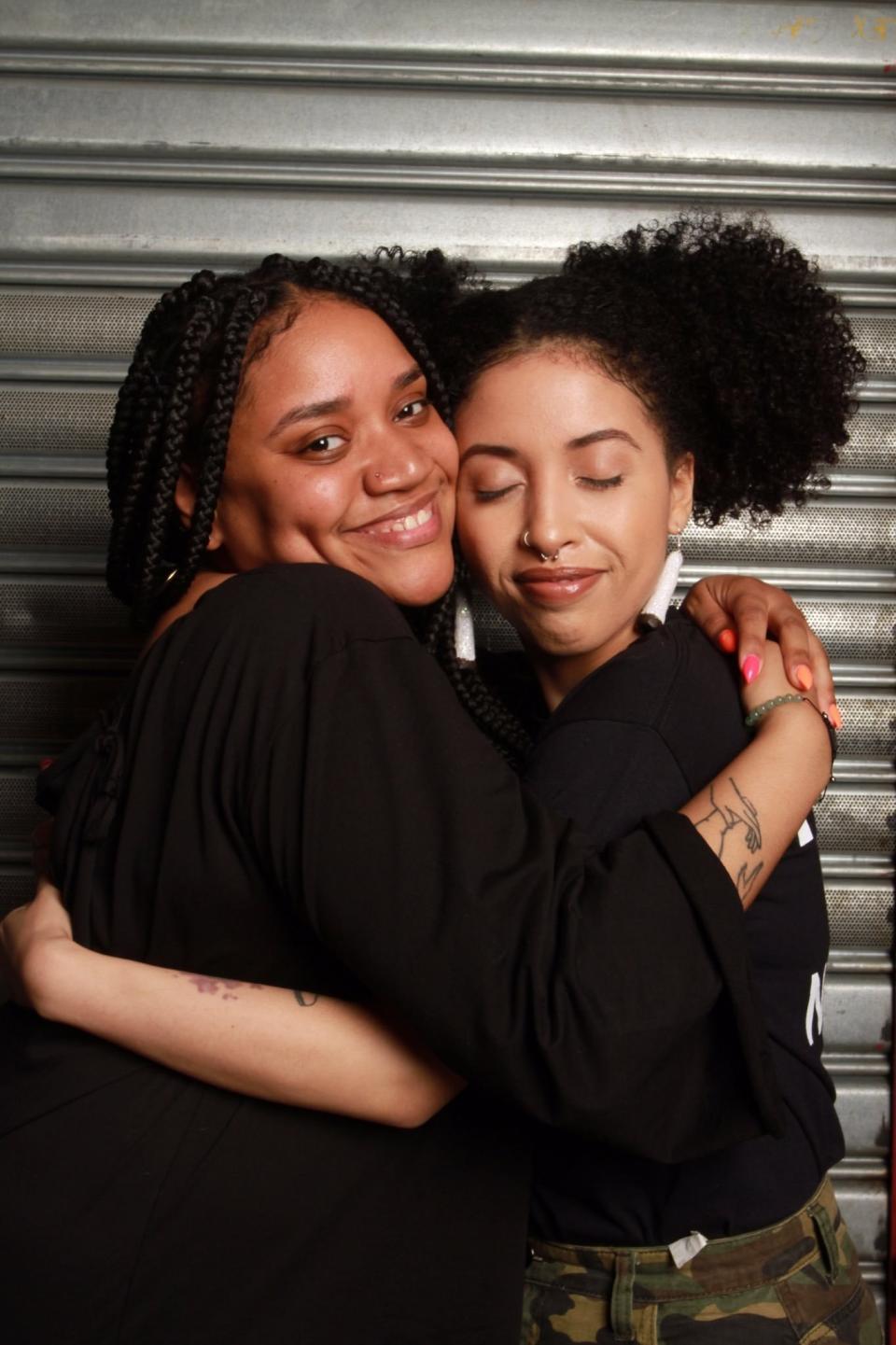
Odiosas
3. Chicas Rockeras SELA
Chicas Rockeras South East Los Angeles is a music day camp that teaches girls to play instruments by doing something a little unconventional to music education: putting them in rock bands with one another. Chicas Rockeras (Spanish for “girl rockers”) runs independently but is part of the larger Girls Rock Camp Alliance, which consists of camps all over the U.S., including New York, Houston, Portland, and more. The organization is based in a predominantly Latinx low-income/working class community, and it’s also run by an all Latina/x and Chicana/x staff. To their knowledge, they’re the only girls rock camp with a bilingual anthem, and that’s because it’s authentically shaped by the Spanish-speaking community it serves.
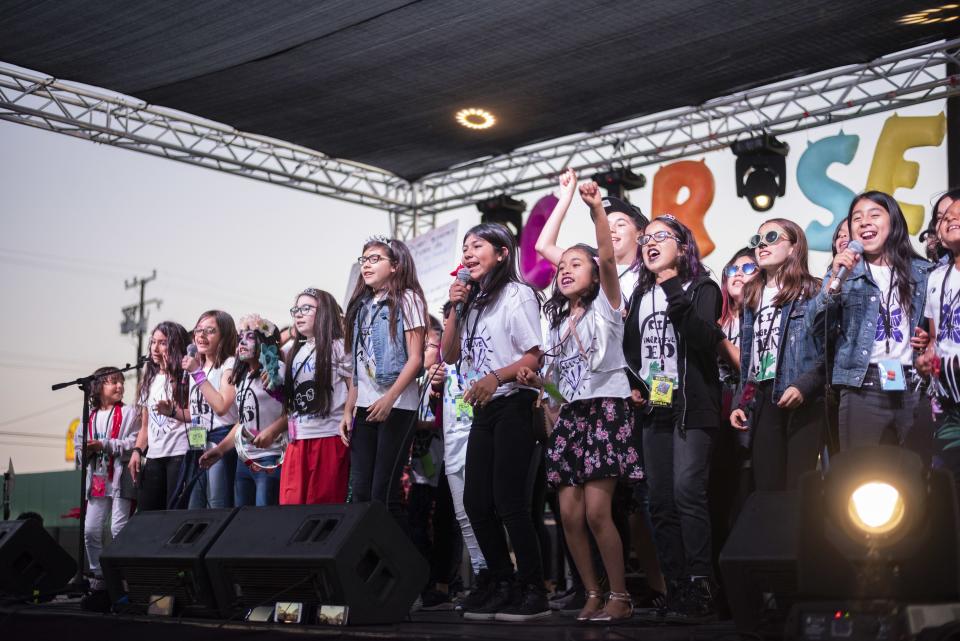
4. Mujeristas Collective
Since 2017, the Mujeristas Collective has been producing zines and zine-fests highlighting the art and writings of Latinx women. The group from Queens, New York, is run by founder Stephanie P. Aliaga, Ariana Ortiz, and Denisse Jimenez. The name was inspired by theologist Dr. Ada Maria Isasi-Díaz and her idea of “mujerismo,” which is a Latinx-based feminism inspired by Alice Walker’s concept of “womanism.” In an email to Teen Vogue, Ariana and Denisse said, “Dr. Ada Maria Isasi-Díaz drew on these concepts to encourage everyone to participate in the struggle for the liberation of Latinas and our communities, as well as to strive for global liberation.” Their next zine — which centers on themes of liberation and religion — will be released this October.
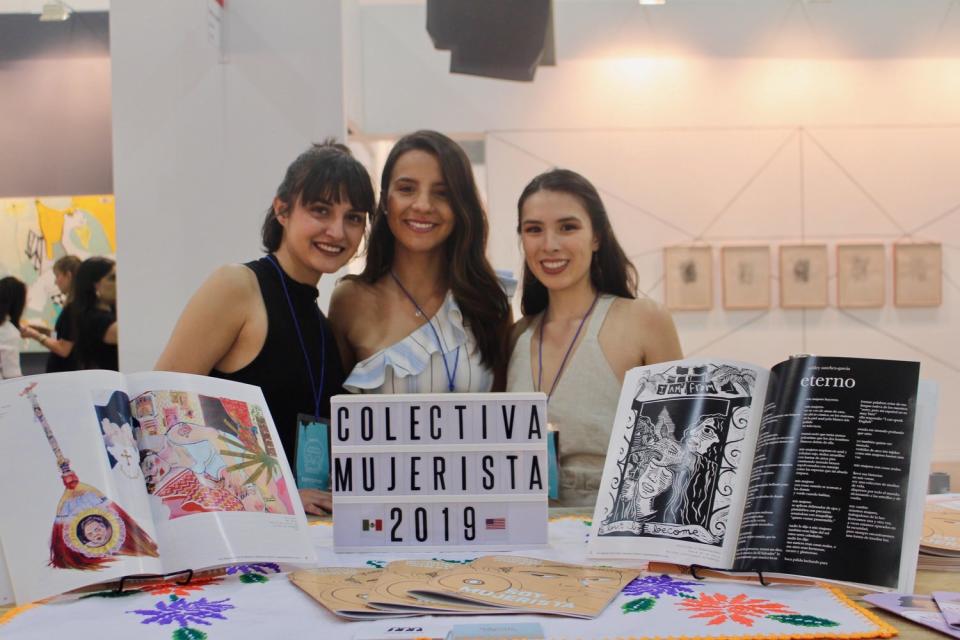
Mujeristas Collective
5. Las Fotos Project
In 2010, Eric V. Ibarra was shocked to learn that there was a dire lack of creative opportunities in LA for young Latinx girls. According to Eric, the city’s affluent and predominantly white westside boasted many, but there were little to none on the eastside, Latinxs are the majority. Las Fotos Project was born out of this critical need for a program dedicated to Latinx girls. LFP provides its students with access to photography equipment at no cost and teaches them how to shoot and document social justice issues in their neighborhoods. As Eric tells Teen Vogue, “It’s really just about empowering and inspiring teenage girls from communities of color throughout the city of Los Angeles.”
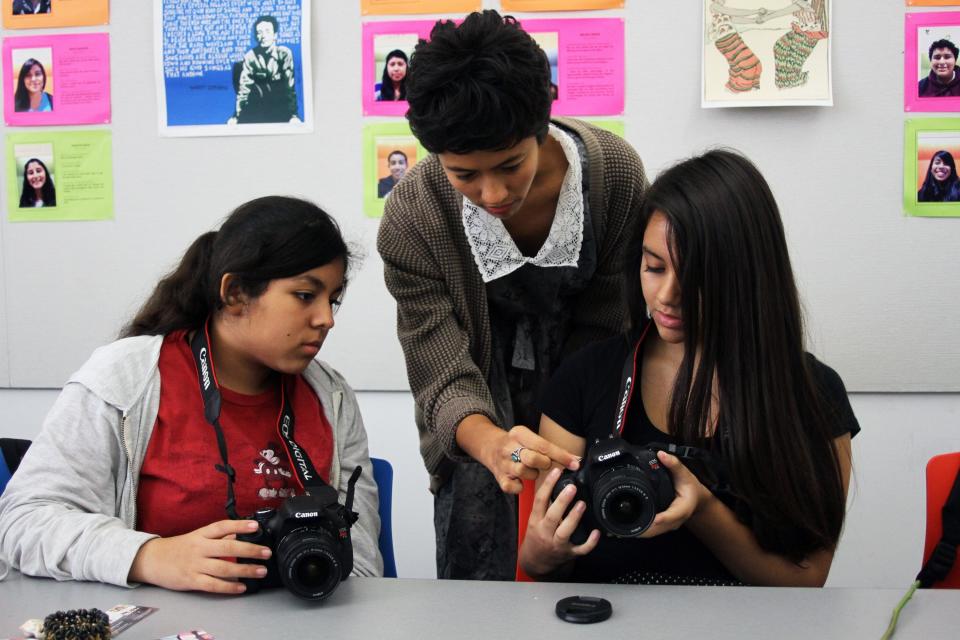
6. Chulita Vinyl Club
Claudia Saenz started this Latinx DJ collective in Austin, Texas, in 2014 as a way to collaborate with other women who also shared her passion for spinning vinyl records. The response was so overwhelming that Claudia expanded her collective to include seven national chapters in other cities throughout the Southwest. No experience is needed to join or start a chapter of Chulita Vinyl Club, as the women encourage those with an interest in the art to inquire and get on board — there’s no elitism here. The collective creates a supportive environment for women by mentoring and teaching each other the business of DJing and tricks of the trade. CVC also frequently hosts open-table nights, where women can show up and play their vinyl records under the guidance of a “chulita.”
7. The O.V.A.S.
Formerly known as Ovarian Psycos, the O.V.A.S. (Overthrowing Vendidxs, Authority, and the State) are a Boyle Heights, Los Angeles, collective that started out in 2011 as a bicycle crew making the cycling scene and streets safer for Latinx women/women of color. They’ve since expanded to doing political work for the community, “Our core values include anarcho-feminist ideals, [and] hood mentality with indigenous understandings. The O.V.A.S. is for the knuckleheads, the cholas, the dropouts, outcasts, and those who choose to live outside the norm and labels that white Amerikkka has shoved down our throats since 1492,” member Adri wrote in an email. The O.V.A.S. also run La Conxa, a venue that hosts punk shows, workshops, instructional classes, and events that address social justice issues.
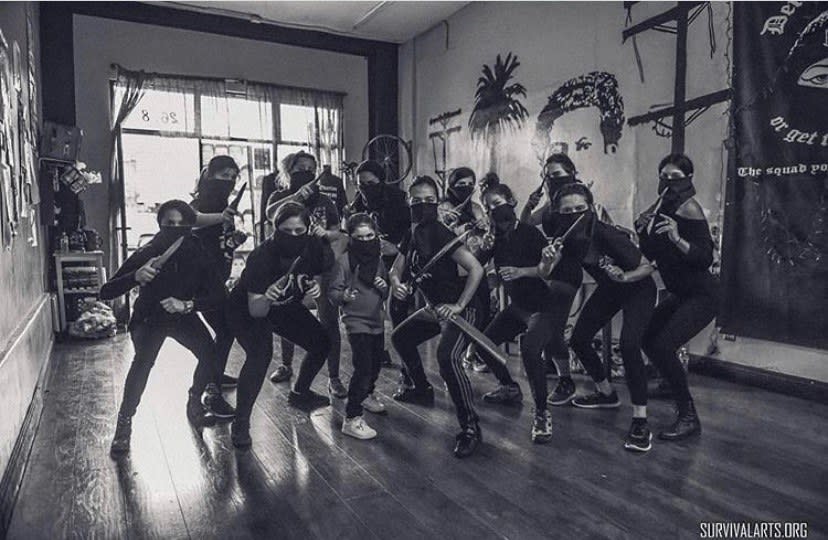
8. Mirror Beauty Workers Cooperative
Tired of the oppression they faced as trans immigrant Latinas, the women of Mirror decided to form New York City’s first trans-Latina-led workers cooperative. Mirror was formed by Lesly Herrera Castillo, Joselyn Mendoza, and Linda Dominguez, with a mission to provide support for transgender immigrant Latinas in the beauty industry. The co-op is currently operating via very DIY means, but they’re in the process of fundraising to open up a space in Jackson Heights, Queens. The goal is to establish headquarters there, but also provide a safe working space for cosmetologists in the trans community.
9. Nalgona Positivity Pride
The Spanish word “nalgona” translates to signify a woman/girl with a big butt, but sometimes it’s used in a negative manner to describe those with larger body types. L.A.’s Nalgona Positivity Pride has reclaimed the word to exemplify pride in one’s body. NPP was formed in 2014 by Gloria Lucas, a Xicana who wanted to create a body-positivity group with an intersectional focus towards Xicana and indigenous women to decolonize their bodies. Gloria’s organization provides resources for those suffering from eating disorders and/or poor body image by helping them subvert these obstacles and ultimately, heal.
10. Mujeres de Maíz
This grassroots arts and multimedia collective is one of the longest-running Latinx groups for women in Los Angeles. Since 1997, Mujeres de Maíz – which translates to “women of the corn” – has provided a platform for women to collaborate and produce workshops, musical showcases, exhibits, and other opportunities in the arts and culture scene. This collective also focuses on highlighting indigenous communities by incorporating spiritual and holistic wellness activities for women — in doing so, they provide the blueprints for decolonization and a return to indigenous rituals.
11. Latinas Uprising
Latinas Uprising is a Chicago-based digital community that was created by immigration lawyer Nubia Batista to support, uplift, and offer valuable resources for Latinx women in the law industry. Nubia is a proud Mexican/Panamanian who has been vocal about her struggles in a profession where Latinx women are marginalized. “Latinas make up only 1.2% of all lawyers in the U.S.,” Nubia tells Teen Vogue. “This means we’re not sitting in the courtroom, boardroom, or legislative tables when huge wide-reaching decisions are made … That can only change if we increase diversity in the law.” Nubia is consequently dedicated to helping others like her. She also has a monthly column in Remezcla called, “Ask an Immigration Lawyer,” where she answers legal questions and offers advice.
12. Colectiva Cósmica
The magical Colectiva Cósmica art collective was founded in 2014 by Texans Barbara Calderón, Maribel Falcón, and Itzel Alejandra Martinez. Despite having two members who currently reside in New York, Maribel tells Teen Vogue, “Our perspective is Tejana.” Colectiva Cósmica sets up art shows, zines, and workshops to create visibility for women in the art community. “We’re not the only cosmical ones in the world – it’s an identity that resonates with people who look like us and relate to who we are, and we want to make sure that they can release that energy as well,” Maribel says. The collective also travels nationwide and has hosted events in Sacramento, Chicago, Houston, and Washington D.C.
Let us slide into your DMs. Sign up for the Teen Vogue daily email.
Want more from Teen Vogue? Check this out: 10 Mixed Heritage People on What Being Latinx Means to Them
Originally Appeared on Teen Vogue

